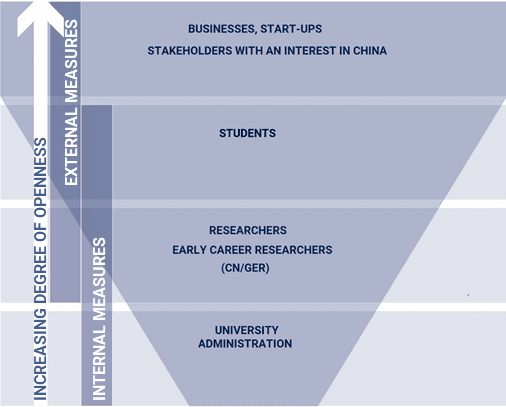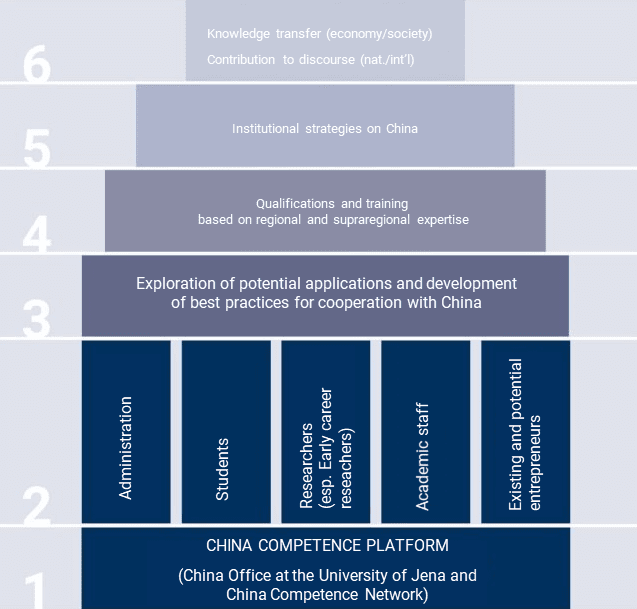

The network
As part of the “Regio-China” funding measure, twelve selected initiatives in the German research and education landscape are therefore being supported by the Federal Ministry of Education and Research (BMBF) in order to deepen and expand their China expertise regionally through exchange with other institutions, to develop new formats and to network.
Friedrich Schiller University Jena is being funded for three years with around 500,000 euros to implement the “China Competence Platform for Higher Education and Research Institutions in Thuringia” in collaboration with Thuringian universities and network partners.
On its website, the BMBF has published an overview map External linkof all BMBF Regio-China projects with a brief description.
From 2017-2022, the BMBF had previously funded eleven projects on the "Expansion of China expertise at German universities"External link. The results of this funding are included in our literature list.
For "China competence" at universities in other federal states, use the network of China centers at German universitiesExternal link.
-
Aims
Jena is a high-tech location with many links to China. This makes it particularly important to raise awareness for a differentiated approach to dealing with China. It also requires clear guidelines to help ensure compliance with ethical and academic principles when initiating and shaping cooperation, as well as relevant qualifications to ensure that this process is legally sound and sustainable. Core elements of this project therefore include a qualification and certificate programme to promote China competency, as well as the development of a strategy for China that addresses important issues such as the protection of intellectual property in cooperation and the handling of dual-use technologies and goods.
This project will also strengthen the exchange of knowledge and good practices at a regional and national level. In this context, it will contribute to the closing of existing gaps in knowledge and competence and to the advancement of a strategy for a differentiated approach to China.
-
Catalogue of measures
The project comprises eight work packages.
Governance, management, and monitoring
As a contact point with proven expertise on China, the Coordination Office at the University of Jena is responsible for ensuring that all measures are implemented and all targets met. Internal and external expert panels will act in a monitoring capacity and provide support by offering advice.Establishment of a China Competence Platform
Flexible office space will facilitate decentralized networking, knowledge transfer, and exchange with stakeholders in the region — irrespective of the contact point’s location. The establishment of a sustainable knowledge base for the documentation and dissemination of results and examples of good practice is a central component of this project.Needs analysis for the improvement of China competency
In order to meet the needs and requirements of our target groups, we will conduct surveys and interviews to determine the current situation and existing needs in order to develop customized qualifications and information services.Potentials and good practice
The project will analyse areas of potential and possible applications focusing on disciplines that are central to building the University’s profile (optics/photonics, sustainability/energy storage etc.) or areas where there is a high level of interaction with Chinese partners. It will establish opportunities for open dialogue and non-public consultation where critical issues can be discussed. Through dialogue, these opportunities will foster an understanding for different ways of thinking and acting and explore the associated opportunities and challenges.Training and qualifications
We will also develop training modules to develop China competency and pass them on to our network partners using a train-the-trainer approach. These modules will include general training modules directed at all target groups, aim to create cultural awareness in relation to China and provide basic knowledge of the country, language, and culture. They will also explore developments in the fields of research, business, and civil society and cover the ethical and intercultural dimension of cooperation. The project will also (further) develop target-group-specific qualification opportunities tailored to the requirements and needs identified in the survey. In offering training, qualification, and network opportunities, a particular focus will be on early career researchers who will be sensitized to the need to require China competency.Development of a Strategy on China
At the institutional level, we will establish a Strategy on China as well as develop cooperation guidelines and review processes. We will also support interested regional institutions in the development and implementation of their own strategies.Knowledge transfer and networks involving the economy, society, and politics
All network partners will contribute to the discourse in various areas of focus at a national and international level. They will actively engage in an intensive exchange within the network of China Centres and through opportunities provided by research alliances. At the institutional level, qualification initiatives will form an integral part of staff development programmes and the curricula for individual subjects. University teachers and graduates will also help to transfer their expertise on China to institutions and businesses in the region.Public relations and communication
Information on China will be published across various channels. The raising of awareness will focus on different target groups and involve publication in research and for the public. -
Project team
- Project management: Dr Claudia Hillinger, Head of International Office
- Project coordination: Linus Schlüter
- Project assistance: Kerstin von Nordheim
-
Steering committee University of Jena
- Graduate Academy: Dr Alexander Schwarzkopf
- Service Centre for Research and Transfer: Valerie Daldrup, Dr Oliver Pänke
- Office of the Vice-President for Research: Dr Karoline Oelsner
- Communications and Marketing: Katja Bär
- Chair of Intercultural Business Communication: Professor Dr Christoph Vatter
- Professorship of Social Geography: Professor Dr Simon Runkel
- Chair of Economic Policy: Professor Dr Andreas Freytag
-
External advisory board
- Dr Sigrun Abels: Sinologist and Director of the "Center for Cultural Studies on Science and Technology in China" (China Center), Technische Universität Berlin
- Professor Dr Hans Gebhardt: Senior Professor of Human Geography (emeritus) specializing in China
- Jochen Kuck: Lawyer and expert in the field of export control, including in the academic context and cooperation with China, Forschungszentrum Jülich
- Claudia Wessling: Journalist, Asia expert and Head of Communication and Publications, Mercator Institute for China Studies (MERICS)
- Professor Dr Xun Luo: Professor of Intercultural Communication and Economics, Justus Liebig University Giessen
The translation in Chinese can be found here in short characterspdf, 440 kb · de and in long characterspdf, 381 kb · de:
我校中國能力項目簡介:整體字pdf, 440 kb · de
我校中国能力项目简介:简体字pdf, 381 kb · de
Room 308
Kahlaische Straße 1
07745 Jena
Google Maps site planExternal link

07745 Jena Google Maps site planExternal link

[1] BMBF, Announcement within the framework of the Federal Government's Strategy for the Internationalisation of Science and Research Guideline for the Promotion of the Regional Development of China Competence in Science (Regio-China), https://www.bmbf.de/bmbf/shareddocs/bekanntmachungen/de/2021/06/3684_bekanntmachungExternal link [retrieved: 24 July 2023]





